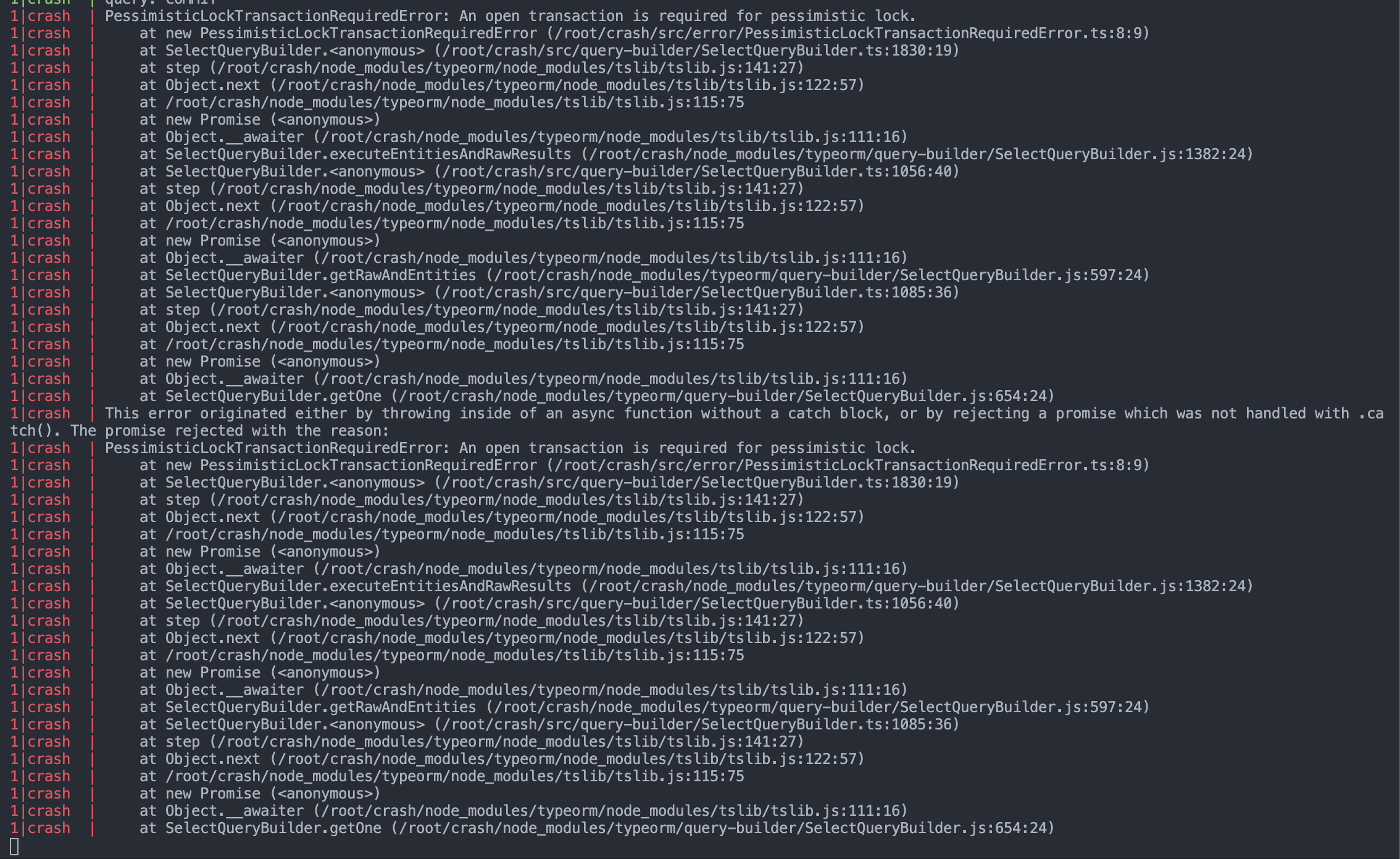A Transactional Method Decorator for typeorm that uses cls-hooked to handle and propagate transactions between different repositories and service methods.
Inspired by Spring Transactional Annotation and Sequelize CLS
See Changelog
npm install --save typeorm-transactional-cls-hooked
## Needed dependencies
npm install --save typeorm reflect-metadataOr
yarn add typeorm-transactional-cls-hooked
## Needed dependencies
yarn add typeorm reflect-metadataNote: You will need to import
reflect-metadatasomewhere in the global place of your app - https://github.com/typeorm/typeorm#installation
In order to use it, you will first need to initialize the cls-hooked namespace before your application is started
import { initializeTransactionalContext } from 'typeorm-transactional-cls-hooked';
initializeTransactionalContext() // Initialize cls-hooked
...
app = express()
...Since this is an external library, all your typeorm repositories will need to be a custom repository extending either the BaseRepository (when using TypeORM's Entity) or the BaseTreeRepository class (when using TypeORM's TreeEntity).
// Post.entity.ts
@Entity()
export class Post{
@PrimaryGeneratedColumn()
id: number
@Column
message: string
...
}
// Post.repository.ts
import { EntityRepository } from 'typeorm';
import { BaseRepository } from 'typeorm-transactional-cls-hooked';
@EntityRepository(Post)
export class PostRepository extends BaseRepository<Post> {}The only purpose of the BaseRepository class is to make sure the manager property of the repository will always be the right one. In cases where inheritance is not possible, you can always Patch the Repository/TreeRepository to enable the same functionality as the BaseRepository
Sometimes there is a need to keep using the TypeORM Repository instead of using the BaseRepository.
For this cases, you will need to "mixin/patch" the original Repository with the BaseRepository.
By doing so, you will be able to use the original Repository and not change the code or use BaseRepository.
This method was taken from https://gist.github.com/Diluka/87efbd9169cae96a012a43d1e5695667 (Thanks @Diluka)
In order to do that, the following should be done during initialization:
import { initializeTransactionalContext, patchTypeORMRepositoryWithBaseRepository } from 'typeorm-transactional-cls-hooked';
initializeTransactionalContext() // Initialize cls-hooked
patchTypeORMRepositoryWithBaseRepository() // patch Repository with BaseRepository.If there is a need to keep using the TypeORM TreeRepository instead of using BaseTreeRepository, use patchTypeORMTreeRepositoryWithBaseTreeRepository.
IMPORTANT NOTE
Calling initializeTransactionalContext and patchTypeORMRepositoryWithBaseRepository must happen BEFORE any application context is initialized!
- Every service method that needs to be transactional, need to use the
@Transactional()decorator - The decorator can take a
connectionNameas argument (by default it isdefault)- In some cases, where the connectionName should be dynamically evaluated, the value of connectionName can be a function that returns a string.
- The decorator can take an optional
propagationas argument to define the propagation behaviour - The decorator can take an optional
isolationLevelas argument to define the isolation level (by default it will use your database driver's default isolation level.)
export class PostService {
constructor(readonly repository: PostRepository)
@Transactional() // Will open a transaction if one doesn't already exist
async createPost(id, message): Promise<Post> {
const post = this.repository.create({ id, message })
return this.repository.save(post)
}
}The following propagation options can be specified:
MANDATORY- Support a current transaction, throw an exception if none exists.NESTED- Execute within a nested transaction if a current transaction exists, behave likeREQUIREDelse.NEVER- Execute non-transactionally, throw an exception if a transaction exists.NOT_SUPPORTED- Execute non-transactionally, suspend the current transaction if one exists.REQUIRED(default behaviour) - Support a current transaction, create a new one if none exists.REQUIRES_NEW- Create a new transaction, and suspend the current transaction if one exists.SUPPORTS- Support a current transaction, execute non-transactionally if none exists.
The following isolation level options can be specified:
READ_UNCOMMITTED- A constant indicating that dirty reads, non-repeatable reads and phantom reads can occur.READ_COMMITTED- A constant indicating that dirty reads are prevented; non-repeatable reads and phantom reads can occur.REPEATABLE_READ- A constant indicating that dirty reads and non-repeatable reads are prevented; phantom reads can occur.SERIALIZABLE= A constant indicating that dirty reads, non-repeatable reads and phantom reads are prevented.
NOTE: If a transaction already exist and a method is decorated with @Transactional and propagation does not equal to REQUIRES_NEW, then the declared isolationLevel value will not be taken into account.
Because you hand over control of the transaction creation to this library, there is no way for you to know whether or not the current transaction was sucessfully persisted to the database.
To circumvent that, we expose three helper methods that allow you to hook into the transaction lifecycle and take appropriate action after a commit/rollback.
runOnTransactionCommit(cb)takes a callback to be executed after the current transaction was sucessfully committedrunOnTransactionRollback(cb)takes a callback to be executed after the current transaction rolls back. The callback gets the error that initiated the roolback as a parameter.runOnTransactionComplete(cb)takes a callback to be executed at the completion of the current transactional context. If there was an error, it gets passed as an argument.
export class PostService {
constructor(readonly repository: PostRepository, readonly events: EventService) {}
@Transactional()
async createPost(id, message): Promise<Post> {
const post = this.repository.create({ id, message })
const result = await this.repository.save(post)
runOnTransactionCommit(() => this.events.emit('post created'))
return result
}
}@Transactional and BaseRepository can be mocked to prevent running any of the transactional code in unit tests.
This can be accomplished in Jest with:
jest.mock('typeorm-transactional-cls-hooked', () => ({
Transactional: () => () => ({}),
BaseRepository: class {},
}));Repositories, services, etc. can be mocked as usual.
The Transactional uses the Typeorm Connection logger to emit log messages.
In order to enable logs, you should set logging: ["log"] or logging: ["all"] to your typeorm logging configuration.
The Transactional log message structure looks as follows:
Transactional@UNIQ_ID|CONNECTION_NAME|METHOD_NAME|ISOLATION|PROPAGATION - MESSAGE
- UNIQ_ID - a timestamp taken at the begining of the Transactional call
- CONNECTION_NAME - The typeorm connection name passed to the Transactional decorator
- METHOD_NAME - The decorated method in action
- ISOLATION - The Isolation Level passed to the Transactional decorator
- PROPAGATION - The Propagation value passed to the Transactional decorator
During initialization and patching repositories, the Typeorm Connection logger is not available yet.
For this reason, the console.log() is being used, but only if TRANSACTIONAL_CONSOLE_DEBUG environment variable is defined.








